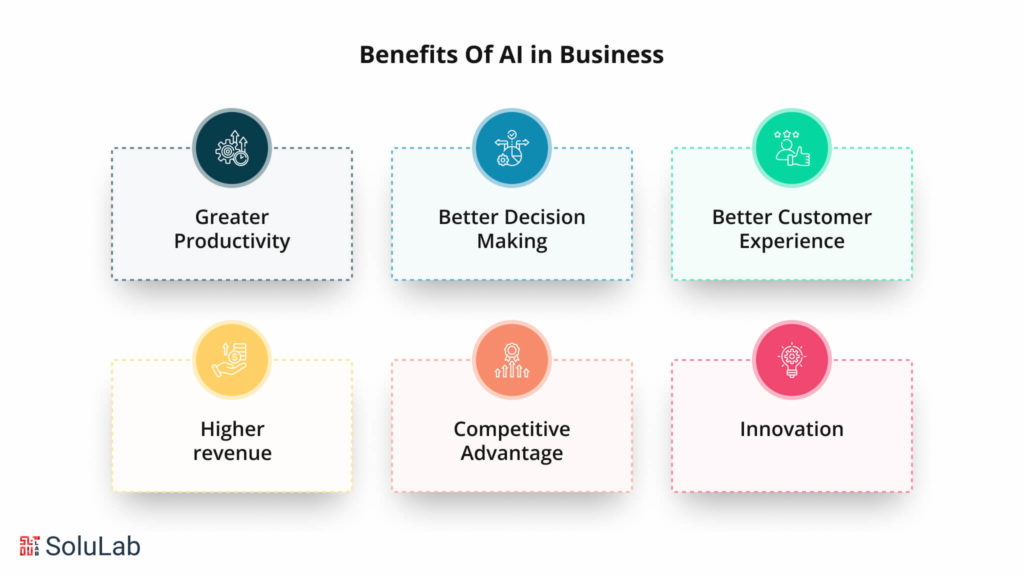
AI is not an abstract distant vision but a real force altering the corporal structure of the business environment. Small, medium-scale, large-scale, new business entities and big business conglomerates are applying this latest creation of artificial intelligence (AI) to enhance expansion, productivity, and creativity. This revolutionary technology is rapidly displacing jobs, redesigning work, and generating new jobs. In this regard, it becomes quite clear that organizations must learn how to survive the advancement of AI in business or be left behind.
What is Artificial Intelligence?
AI use cases can be broadly described as the one whether it is an organized bloc or a system of mechanisms necessary to display intelligence and to obtain it in the same way as human beings gain their intelligence. It refers to developing smart entities which are defined as entities that can sense, learn, know, and act to accomplish certain tasks. When it comes to definition of the AI, this can be described as the synergy of multiple methods such as NLP, Machine learning, and deep learning.
Below are some of the real-life situations that have been implemented with the use of AI in the business world; Smart Personal Assistants such as GOOGLE Home, AMAZON Alexa, and Siri Apple. These are devices that use artificial intelligence whereby the devices are capable of recognizing voices and responding to them and even chitchatting. They can also let them call their friend, warn them, tell them something, manage the smart devices in their house, and even wake up their companions. The idea of virtual assistants presents the essence of what artificial intelligence is and how it can fundamentally change people’s experience of the relationship with technology and its language, as well as access to data.
Transforming Business With AI
It can be stated that artificial intelligence is not only a concept of the future but a reality-shifting corporate reality. With more and more companies realizing the value of AI applications in business it is becoming an essential weapon in the businessmen’s arsenal ranging from a source of innovation to efficiency.
There is no doubt, that the way artificial intelligence is altering businesses is through automating many processes. Many simple tasks that need not be handled by humans such as data entry, and answering common customer inquiries can be handled by AI systems, and this way, human employees can focus on complex and creative tasks. Use AI in business contours of relation causes improved production efficiency and ultimately cheaper costs.
Since decision-making is an important organizational structure, it is also developing with AI in business intelligence. AI systems are capable of identifying weaknesses that ordinary personnel might not be able to discern from large amounts of data. This is beneficial to firms in that they can make projections for future earnings, disperse their assets efficiently, and also make improved decisions.
Machine learning in retail by Application of AI tools in business in analyzing client purchases is an excellent way of improving inventory control in the retail industry and recommending individual client items. The fourth area touched upon is customer experience; this area is also significantly influenced by the implementation of AI in business strategy. Virtual help services, automated with the benefits of AI in business, are available around the clock; they answer clients’ inquiries and correct issues swiftly. Consumers are also served through the personalization of goods and services through the identification of areas that need to be developed through the study of user input.
Be that as it may, there are many opportunities in today’s artificial intelligence; however, the utilization of this concept requires certain wisdom. Thus, people must invest in AI for startups, AI infrastructure has to be created, and ethical problems have to be addressed. Businesses that incorporate the best AI in business management shall stand to gain and reap big as the technology progresses during the new dispensation.
How is Business Using AI Tools?
Nowadays, how to use AI in business is applied by tens of thousands of companies in various practical spheres to increase efficiency, reduce the number of failures, and gain a competitive advantage. The following are some important domains:
- Improved Customer Experience: Consumers’ welfare has now begun experiencing positive changes through the creation of happiness and loyalty through recommendations, good chatbot services and anticipative customer services the AI uses in business.
- Optimized Operations: Some of the specific benefits, that businesses are witnessing from the application of cooperative computing systems are; cost reduction through optimizing the application process through the use of AI in business intelligence, the supply systems through the use of the networks, the effectiveness of maintenance through the use of the networks in maintenance, quality of products through the application of networks in quality assurance.
- Data-Driven Decision-Making: Thus, within the parameters of applying AI in the business world to the evaluation of big data, this approach provides the opportunity to make efficient decision-making within the scope of resources, threats, and strategy.
- Accelerated Innovation: AI agent is the architectural and artistic ability to help a firm create new products, enhance the existing ones, and identify opportunities within the market.
- Financial Performance Boost: In the area of algorithmic trading, credit scoring as well as credit risk assessment, fraud detection and analysis, and financial and business analysis AI use cases enhance the stake of finance.
- Talent Management and HR Optimization: It applies the concept of talent management and improves the processes of recruitment, employee attraction, and satisfaction, as well as HR operations and practices.
- Industry Transformation: Hence, artificial intelligence is a new business solution, the replacement of challenging problems’ resolver, and the general change in many industries.
Examples of AI in Business
AI is no longer something that belongs in the future. It is being integrated across a variety of corporate processes, inspiring innovation and productivity. Here are AI in business examples from real life:
Customer Support
- Chatbots and Virtual Assistants: Generative AI for Enterprise has powered business applications such as chatbots and virtual assistants for companies like Amazon, Apple, and many more in providing quick, responsive customer service and answering frequently asked questions efficiently. This frees human agents to deal with complex issues.
- Personalized Recommendations: AI is used in business algorithms to study consumer behavior and interests, enabling online retailers such as Amazon and Netflix to give incredibly personalized product recommendations or content. This is a personalized approach that increases sales and raises client satisfaction.
Marketing and sales
- Predictive analytics: AI in business management to assess customer data to be able to project what’s going to occur in the future, enabling them to run much more targeted ad campaigns and effective sales strategies. For example, retailers will be able to estimate demand for a product to prevent overstocking or stockouts.
- Image Recognition: AI-powered image recognition analyzes pictures from social media, detecting customer preferences and trends, and creating new collections based on such analysis for fashion companies.
Supply Chain and Operations
- Supply Chain Optimization: AI tools in business can be used to optimize the supply chain, anticipate demand, and manage inventory levels, which helps to smooth transportation routes. Companies like Walmart Use AI in business to cut down on costs and improve the productivity of their supply chains.
- Quality Control: Manufacturing companies apply AI-driven image recognition systems to inspect items for flaws to ensure that standards of quality are met.
These are just a few examples of AI in business. It is sure that shortly, much more interesting applications of AI in the business podcast will turn up as it matures and transforms the way organizations are run.
Benefits Of AI in Business

Artificial intelligence has several benefits of AI in business, regardless of the industry. Some of these significant advantages are:
1. Greater Productivity: Artificial intelligence frees humans from doing mundane tasks so that they concentrate their time on core goals. It, therefore, saves money and increases output. For example, AI in business analytics automation can ease supply chain-related processes, while chatbots can fulfill common customer queries.
2. Better Decision Making: Artificial intelligence analyzes huge amounts of data to find trends and patterns that human eyes would miss. Therefore, such an organization can reduce risks and cap on such opportunities, only if it uses data-driven decisions. For example, AI in Sports boosts performance by providing valuable insights and analysis, giving teams a competitive edge.
3. Better Customer Experience: AI applications in business helps businesses provide customers with personalized experiences. Through consumer data analysis, businesses can provide customized advice to customers, enhance customer service, and foster stronger relationships with customers.
4. Higher revenue: AI in business management provides an opportunity to generate higher revenue through the identification of untapped new markets, price plan optimization, and maximization of sales effectiveness. For example, recommendation systems powered by AI can increase sales by making relevant product recommendations to customers.
5. Competitive Advantage:Early adopters have a lot to benefit from the use of AI in business. Businesses can leverage AI for innovation and operational efficiency to set them apart from their rivals in businesses, thereby increasing their market share.
6. Innovation: AI in business intelligence can act as a booster for innovation, as companies may use it to test new ideas, develop new products, and research new areas. For example, AI can be applied to generate new material designs or creative content.
What Future Does AI in Business Holds?
The fact that technology is still under development foreshadows that actually, we should expect much more profound effects on operations and sectors. A very promising area of growth lies in the area of hyper-automation, where AI agent is combined with Robotic Process Automation (RPA) to drive the automation of corporate activities. This would mean never-seen-before levels of production and efficiency. Next up, generative AI for enterprises, capable of churning out vast content, will drastically disrupt marketing, content development, and customer support.
The role of will also be larger in decision-making. Due to its advanced analytics and predictive capabilities, AI applications in business will turn into a crucial tool for resource allocation, risk assessment, and strategy planning. Further progress in AI development will lead to its application combined with the Internet of Things in smart solutions able to enhance customer experience, predict maintenance, and optimize operations.
Even though some problems—data protection, ethical considerations, and talent recruitment—are yet to be solved, the general trend of AI in business is positive. It pictures a future with artificial intelligence that is seamless in every running of the corporation, breeding innovation, expansion, and competitiveness.
The Bottom Line
The AI development company is here to make you thrive within the digital marketplace and must now make integration within daily operations a necessity rather than an option. Artificial intelligence is capable of transforming businesses and creating new possibilities by just making the repetition of some process automatic and with innovation. If common in business, then the companies using AI would be well placed to have competitive advantages by improving consumer experiences and streamlining processes as the technology advances.
Effective AI implementation requires, however, careful planning, personnel hiring with qualification requirements, and knowledge of the different advantages and disadvantages. Organizations have to be very serious about security, ethics, and data privacy.
The power of AI will enable businesses to create new opportunities and build a better future. Are you ready to hire an AI developer? We at SoluLab are here as trustworthy partners in this transformation. With our years of expertise in AI and machine learning, we can help to empower business objectives with AI. Contact us today to discuss how we can help power up your AI use in business.
FAQs
1. What are some of the business benefits of AI Agents?
Key benefits provided by AI agents include improved decision-making, productivity enhancement, heightened customer experience, increase in revenue, and competitive edge.
2. What are common barriers to implementing AI?
Common problems faced in that it requires heavy investments, lack of talent, ethical issues, and poor quality and accessibility of data.
3. How can sales and marketing utilize AI Agent?
Applications of AI agent in Sales and Marketing include lead scoring, lead segmentation, personalized marketing, predictive analytics, and customer churn prediction.
4. Is AI replacing human jobs?
Even while AI is automating certain kinds of work, it is also creating new avenues as far as jobs are concerned. AI is intended to complement, not replace, human potential.
5. How do I implement AI in my business with SoluLab?
SoluLab provides a wide range of services related to artificial intelligence: strategy, development, and implementation. Our experts can help you identify prospective AI opportunities, develop unique AI solutions, and ensure the successful deployment of AI.






